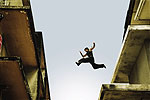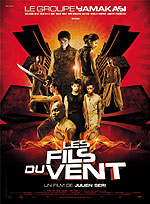Ten years ago not many would have bet on seven teenagers
and 20-somethings transcending their suburban environment
by creating a unique form of high-rise entertainment.
But that’s just what the Yamakasis did. Treating
the edifices of northern Parisian suburbs like Sarcelles
and Evry as their elaborate playgrounds, the seven (plus
a couple of others, who have since gone their own way)
began developing their skills as real-life spidermen.
A mixture of precision jumping and urban leapfrog, the “art
of movement” or “parkour” as
it is variously known, has since become a worldwide phenomenon,
with the first ever “parkour” jam
taking place in London this August (6-9).
Not content with taming their urban environment, the
original seven — whose name “Yamakasi” comes
from the Zairean dialect Lingala meaning “strong
spirit, strong body, strong man” — are now
inventing themselves a future on the silver screen. Their
latest movie “Les Fils du Vent,” a
unique entry in the French lingo chop-socky genre, is
out in France on June 23. While a little rough around
the edges, the film works pretty well as a showcase for
the seven’s various talents.
Today I have a meeting with one of the original Yamakasis
and it’s Vietnamese-born Chau Belle Dinh or “Baseball,” as
he is also known, who has drawn the short straw. While
his six pals — another of whom was born in Vietnam,
two in Africa and three in France — are no doubt
fine tuning their “tic tac” or practicing
their “passe muraille” (they train
at least six hours a day), Chau it is who has to talk
turkey with me. He is accompanied by Elodie Yung, a law
student with a black belt in karate, who plays Chau’s
feisty sister in the new film.
Chau who grew up and still lives in Sarcelles, remembers
a bunch of friends, all of them linked by an interest
in sports, who got together and began to develop what
might accurately be described as a sort of gravity defying
urban ballet. Says Chau: “After a while friends
and family were telling us why don’t you show people
what you can do, nobody’s ever seen something like
this before. So we sent Luc Besson, who was about the
only French filmmaker at that time to make the kind of
films we appreciated, a cassette of us in action.”
After that things moved quickly and Besson signed up
the Yamakasis to provide the stunts for a key scene in
the action movie “Taxi 2.” “That
film was like a test for us,” says Chau, “Besson
wanted to see if we were really cut out to be in films.” And
so pleased was Luc with the boys’ work that he
set up “Yamakasi,” a movie built entirely
around them. At one point in that film an agitated police
chief famously intones: “The Japanese had ‘The
Seven Samurai,’ the Americans ‘The Magnificient
Seven’ and what do we end up with? The seven troublemakers.”
But far from being the mischievous troublemakers depicted
in Besson’s film, the real-life Yamakasis, are
modern-day role models. For a start none of them smoke,
drink or take drugs and far from letting incipient fame
go to their heads, the boys from the burbs, are putting
as much as they can back into their community.
Last year they set up an association teaching the “art
of movement” which has attracted some 30 youngsters
aged five and upwards. “We want the next generation
after us to benefit from the art of movement in the same
way that we did,” says Chau. “It’s
not necessarily about becoming a Yamakasi, we try and
really take care of these youngsters, to look out for
their educations and make sure everything is going alright
at home.”
I wonder about the kids’ parents, how do they
react when they find out their kids are learning how
to scale walls and jump through windows? “It’s
true the parents always start off being afraid for their
children. But it’s up to us to convince them their
children are learning in a safe environment. They have
to realize that their kids are much better off than we
were. Nobody was there to tell us not to do something
or that we might get hurt.”
Anyone who watches the Besson movie might imagine the
Yamakasis getting into endless scrapes with the police.
Not so says Chau, “That’s just Besson’s
humor in inverted commas. The only time problems arise
are when the police don’t know who you are and
think that maybe someone’s breaking something or
trying to burgle someone. But as we’re always training
in the same places there’s no problem. The police
aren’t stupid, they don’t need any extra
problems.”
After exploding one myth I wonder if Chau is about to
blow up another when I ask him about life in the suburbs.
Was it really as difficult to get a start as people often
suggest? “It’s true that it wasn’t
easy. It was incredibly hard for us to get a foot in
the door. When we started off we didn’t have two
pennies to rub together. We went out knocking on doors
and most people didn’t give a damn what we were
up to. That was ten years ago, now things are starting
to get a bit better. With people like Jamel, Eric and
Ramzy and now us doing really well, people are waking
up to the fact that there is a lot of talent in the suburbs
and that it just needs to be tapped.”
But Chau is doubtful if he’d have made on his
own. “We made the choice to live as seven and took
on board all the constraints that involves. When one
went hungry we all went hungry. That’s the true
story of a group.”
But it’s not for everybody as Elodie soon realized
when she became an honorary member of the group. “I
don’t think I would be capable of doing the kind
of training they do every day. It doesn’t correspond
with the way I choose to live my life. As it’s
an art of movement they’re basically on the go
all the time, even when we went out for a bite to eat,
they would end up swinging from the lampposts.”









